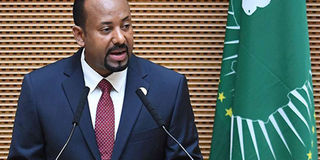Factors fanning Borana and Gabbra fights in Kenya

Ethiopia's Prime Minister Abiy Ahmed delivers a speech during the 11th Extraordinary Session of the Assembly of the African Union in Addis Ababa, Ethiopia, on November 17, 2018. Upon his election, the crackdown on Oromo Liberation Front stopped. PHOTO | MONIRUL BHUIYAN | AFP
What you need to know:
- In 1980s, Kenya and Ethiopia signed a treaty of friendship and cooperation meant to protect them from expansionist and irredentist dreams of Oromo and Somalia.
- During the reigns of Emperor Haile Selassie and Mengitsu, the Borana — in both Ethiopia and Kenya — had received arms to keep the irredentist Somalis at bay.
On July 2, 1992 in Nairobi’s uptown Ngara, four hired hitmen traced Ethiopia’s most-wanted opposition activist Jatani Ali to the obscure Tea Zone Hotel. By the time they left, Ali lay dead in his room.
Previously, Mr Ali had served as the governor of the Borana Province in Ethiopia under the leadership of Mengistu Haile Mariam, but had escaped to Kenya after the fall of the Derg, a committee of nearly 120 military officers who came to power in Ethiopia after ousting Emperor Haile Selassie in 1974 and ruled the country until 1991.
By the time of his death, Mr Ali was the undisputed leader of the Borana in both Kenya and Ethiopia — especially those who still harboured the hope of founding what they regard as the Oromia Republic.
How this expansionist and secessionist dream has destabilised politics in northern Kenya is mostly taken for granted — although widely acknowledged in security and diplomatic circles.
LYNCHED
In northern Kenya, Gabbras — who apparently speak Borana language — had for years refused to play ball with the Oromo Liberation Front leaders and other secessionists and have thus been at loggerheads with their Borana counterparts.
The casualties of this internecine war are still piling up and politicians have always used the Oromia nationalism to whip up support.
Some 28 days ago, on December 16, 2018, a rowdy mob of extremist Boranas chased the senior chief of Dirib Kombo, Mr George Godana Bika, and stoned him to death.
His crime: He was alleged to be a “traitor” — betraying Borana to Gabbra.
Mr Bika was killed while attending the funeral of police activist Dako Galdalo Kiso, who had been shot dead in a silent tit-for-tat political feud disguised as water wars.
But that was not all, the extremists also used fuel from his GK motorcycle to partially burn his body.
ABIY AHMED
The murder also rekindled memories of the death of Daudi Debaso Wabera, a former District Commissioner in Isiolo, who was killed on June 28, 1963 while on a mission to dissuade the Borana from joining the secessionist efforts.
While Nairobi’s Wabera Street is named after him, many other government officials have been killed in the line of duty and the latest is senior chief Bika.
The murder of Bika was not an isolated incident and that is why it was Inspector-General of Police Joseph Boinnet who called for the arrest of the individuals who incited the mob.
The murder is all connected to the politics of the Oromia nation, which is now excited with the election, for the first time, of an Oromo, Abiy Ahmed, as the Prime Minister of Ethiopia.
We shall come back to that in a while — but that Kenya is caught up in what political scientists regard to as politics of identity in the Horn of Africa is now clearer.
When Mr Ali was assassinated in Nairobi, fingers were pointed at the Ethiopian Embassy which was accused of harbouring the killers and helping two of them escape.
ASSASSINATIONS
The assassins were believed to be members of Prime Minister Meles Zenawi’s Tigrayan People’s Liberation Front (TPRF), which was hunting leaders of the Oromo Liberation Front (OLF), who were still pursuing the dream of an Oromia nation, a year after he had toppled the Soviet-supported Haile Mariam’s regime.
Saku MP Jilo Falana, a Borana, told Parliament on July 21, 1992 that two of the murderers were holed up in the Ethiopian Embassy in Nairobi and that an embassy car had been used as the getaway vehicle.
Falana also claimed that Kenya and Ethiopia officials had held a meeting on the Ethiopian side of Moyale town on June 23, 1992 to plan the murder after which the killers moved to Nairobi to kill Mr Ali.
Nobody knows the truth but the high court, while releasing two of those charged with Ali’s murder, described the assassination as “well-executed”.
The only reason why Kenyan security would side with Ethiopia, at that time — and if it did — was to protect itself from the Oromo expansionism.
Certainly, Mr Ali was in the wrong place, at the wrong time.
TRAP
By the time he arrived in Nairobi in April 1992, he was emerging as the figurehead of the push for an Oromia nation, and although he had not joined the Oromo Liberation Front, he was the undisputed leader.
The court was told that on that day he was heading to Thika, but since it was getting dark — and for security reasons — he decided to stay overnight at the Tea Zone Hotel on the suggestion of a businessman, Goba Liban.
The suggestion was, perhaps, a trap. Although his bodyguard — Guyo Miyo — informed Ali that there were three suspicious Ethiopians at the hotel lobby, he would later reveal that he was advised by his boss to leave and come the next morning.
An hour later, gunshots rang out and the watchman saw two men running out and escape into the night.
Although two Ethiopians, Haile Kidu Gemechu, who was staying in the room adjacent to Ali's, and businessman Goba Liban were arrested three years after the murder, the case eventually collapsed and they were set free for lack of evidence.
TREATY
Actually, Kenya was not interested in prosecuting the case — and a police report was written two years after the murder.
Some 57 days after the perceived suspects were set free by Justice Oguk, Ali’s bodyguard Miyo was shot in the head on February 27, 1996 in Moyale town.
Locals blamed it on Ethiopian soldiers who were pursuing sympathisers of Oromo Liberation Front.
Four days later on April 3, 1996, Hussein Sora, a Borana lawyer who had compiled a 22-page memorandum to the Kenya government accusing the Ethiopian government of causing the act of banditry in Moyale and Marsabit districts, was also shot dead.
Ever since the days of Haile Selassie, Kenya and Ethiopia have had a defence pact; and in 1980s the two countries signed a treaty of friendship and cooperation meant to protect them from expansionist and irredentist dreams of Oromo and Somalia, which wanted to get parts of North Eastern Kenya and Ethiopia’s Ogaden region.
MEDIA
Whether this dream of an Oromia nation will still linger on with the election of Ahmed as Ethiopia’s leader and the lifting of OLF’s ban, or how it will complicate the tribal relations in northern Kenya will be an interesting political watch in the coming years.
Four months ago, the Oromia Media Network, once banned in Ethiopia, and led by Jawar Mohammed, launched its Nairobi office in a function officiated by Mohammed Ali, the Marsabit County governor. He encouraged OMN to “unite” the Oromo speaking people.
During the reigns of Emperor Haile Selassie and Mengitsu, the Borana — in both Ethiopia and Kenya — had received arms to keep the irredentist Somalis at bay.
But in 1990, the Borana threw their support behind the Oromia nation and, as a result, became the target of Zenawi’s government.
UNITY
Thousands were arrested and locked while thousands escaped to Kenya with arms and an agenda to one day bring together all the Oromo-speaking communities into one nation. Northern Kenya has been the theatre of this war.
The election of Prime Minister Ahmed — who in April became the first Oromo to hold the post — has led to a shift in the Oromia politics.
Jailed dissidents have been set free and the crackdown on Oromo Liberation Front stopped.
Previously, the Gabbra in Ethiopia had supported the EPRDF government and local politicians aligned themselves to factions in Ethiopian politics.
Whenever the Gabbra in Ethiopia have a feud with the Borana, the same is brought to northern Kenya in tit-for-tat wars that don’t seem to have an end.
@johnkamau1, [email protected]
FEEDBACK
The forgotten private John Itumo
Once again you have come up with a brilliant piece about John Itumo. My late father served in 3 KAR and I am sure he would have known him.
I immediately share the story with my brothers. The missing link in the exposé was if you were able to trace where he came from, his relatives or if anyone may have read the story and contacted you. This would certainly complete the otherwise very nice story.
Dr James N. Mwanzia, Snr. Public Health and Health Systems Specialist
****
Your article on John Itumo, a Kenyan soldier for the British government who was hanged in an Asian country in the 1950s made a good reading.
He liked the people of the country where he was sent to serve in the (post) Second World War by Britain.
He developed a loathing for the white man and actually stabbed one to death, leading him to the gallows.
I have checked online and found that Itumo is a name of a Kamba man.
I believe there are Itumo's relatives in Kambaland or elsewhere who would like to add something to the story. It would require a little bit of effort to track them.
Githuku Mungai
****
John wasn't alone among the many young men who fought on the British side.
Any time the Japanese caught an African soldier, he would be radicalised and it's no wonder the 40 group of Bildad Kaggia, General China, Fred Kubai and co started agitating for change.
They realised the white man was not immortal but a coward like any other.
They also realised they were fighting a war for the oppressor. Itumo must have harboured the bitterness of how Burma campaigners were abandoned while white colleagues were rewarded.
Githaiga Kairu
I am an ardent reader of your articles. You should do documentary movies for Kenya.
The Itumo case can be a really good one for the currently waning patriotism. Kudos for your research and keep up the good work.
Ben Kago




